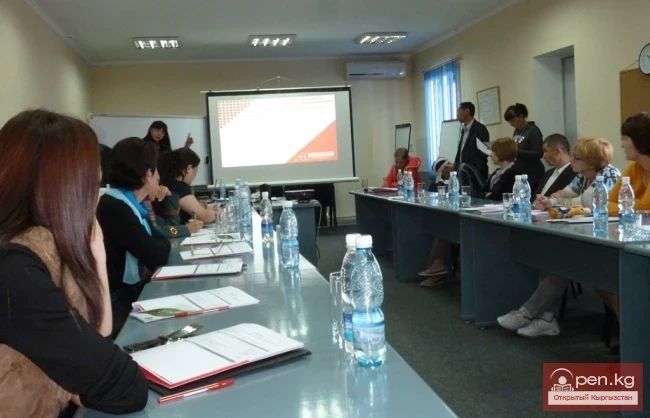Opioid Substitution Therapy: Achievements and Challenges
On September 25, 2014, a round table was held in Bishkek at the "Alpinist" hotel to discuss the achievements and problems in the implementation of the opioid substitution therapy (OST) program in Kyrgyzstan. The event included a report from the Public Fund "Alternative in Narcology" on the steps taken, a discussion of the current situation, and planning further actions to protect the OST program and its participants from discrimination. Decision-makers, representatives from the Ministry of Health of the Kyrgyz Republic, the Republican Center for Narcology, the city administration, law enforcement agencies, international organizations, and community activists, including relatives of people undergoing treatment for injection drug use (IDUs), were invited to participate in the round table.
The OST program is an alternative approach to treating heroin addiction. Medical professionals are joining forces in the fight against this ailment together with international and non-governmental organizations, as they provide additional resources for organizing prevention and treatment for drug addicts in Kyrgyzstan, of which there are officially more than 10,000 people. The consumption of injection drugs threatens the spread of HIV in the country. More than half of all registered cases of HIV infection in Kyrgyzstan are a result of injection drug use. The actions of all existing programs of the Ministry of Health of the Kyrgyz Republic and development partners (needle exchange, training of medical personnel and social workers, opioid substitution therapy, etc.) are primarily aimed at preventing HIV and reintegrating patients into a socially-oriented life.
According to the Republican Center for "AIDS," as of September 1, 2014, there were officially registered 5,537 cases of HIV infection in the Kyrgyz Republic, including 5,296 among citizens of the Kyrgyz Republic (3,608 men and 1,688 women), with 667 people diagnosed with AIDS. A total of 1,012 HIV-infected individuals have died, including 325 from AIDS.
In the first 8 months of 2014, 401 HIV-infected individuals were identified (216 men and 185 women), including 102 injection drug users. A positive aspect is that the number of identified cases of HIV infection is increasing each year; compared to the same period in 2013, it has increased by 20% (from 334 cases). Harm reduction programs contribute to increasing the adherence of HIV-infected IDUs to antiretroviral therapy and reducing dangerous injection practices.
Currently, there are 30 OST points operating in Kyrgyzstan: 6 in Bishkek, 7 in the Chui region, and 10 in the southern region, including 7 in correctional institutions. Up to 1,100 IDUs participate in this program.
Methadone is one of the main medications used in the treatment of heroin addiction. Opioid substitution therapy was introduced in Kyrgyzstan in 2002. Since the program's inception, about 4,000 people have passed through it.
Among the countries of the former USSR, OST is conducted in Lithuania, Latvia, Estonia, Moldova, Azerbaijan, Georgia, Ukraine, and Kyrgyzstan. Currently, about 1.5 million people worldwide are receiving it. OST is being implemented in all European Union countries. For example, in Italy, 27-29% of patients with opioid dependence receive substitution therapy; in Spain, this percentage ranges from 41 to 86%; in Germany, it ranges from 33 to 63%; and in the Netherlands, it ranges from 40 to 47%.
Despite ongoing attacks on the program, substitution therapy is functioning and helping many. Each client who comes to this program is a person in whose family peace and tranquility reign, who is not in places of deprivation of liberty because he does not commit crimes and has no need to seek money for another dose; he is a specialist who works for the benefit of his family and society.
Opioid substitution therapy is a method that minimizes the harm from drug use, prevents deaths from drug overdoses, and warns against the spread of dangerous diseases. According to specialists in HIV and drug dependence, the implementation of therapeutic and rehabilitation measures for drug addiction patients, conducting substitution therapy, and preventive programs for HIV/AIDS should be highlighted as independent areas of state policy in this sphere.
Participants of the round table reviewed the results of the activities of the Public Fund "Alternative in Narcology" over five years of existence. They noted that in recent years, considerable efforts have been made in Kyrgyzstan to promote programs for the prevention of HIV infection and to reduce the harm from injection drug use. Thanks to the political will of the country's leadership, the contributions and efforts of state, non-governmental, and international organizations, the Kyrgyz Republic remains a country with a low level of HIV infection spread.
Among the problems identified at the round table were: the absence of a law on drug prevention, the combined use of methadone with diphenhydramine, somnol, and other psychoactive substances, discrimination by law enforcement officers and medical professionals, the stigmatization of OST clients by active drug users, as well as various sects.
The substitution therapy program needs development and expansion of access to treatment in remote areas of the country where there is a need for OST, and in places of deprivation of liberty. According to the participants of the round table, it is also necessary to expand social assistance for OST users to help them adapt to life in society more quickly.
According to Irina Pugacheva, director of the Public Fund "Alternative in Narcology," her organization's activities are aimed at improving the quality of life for participants in the opioid substitution therapy program to facilitate their reintegration into the social life of the country. Currently, with the financial and technical support of the Soros Foundation-Kyrgyzstan, the Public Fund "Alternative in Narcology" is implementing the project "Advocacy of the OST Program and Rights of OST Clients."
One of the participants in the OST program, Alexander, shared his story about how he came to this program:
“I am 40 years old and I have two children. I started using drugs through injection, with a needle, since 1996. Before that, I just experimented, sniffed, and smoked. I injected until 2008. I knew about the methadone program, but I didn't believe in it; I only heard bad information. My wife brought me to the opioid substitution therapy program. She saw that we were always out of money, even though we had our own shop. Before methadone, I never thought about my family. Before falling asleep at night, I only thought about one thing: how to wake up in the morning and where to steal something, whom to beat up to get money for my next dose, because without it I was in withdrawal. From the first days on methadone, I realized that I could work freely; my relationships with my family improved. Of course, there were relapses when I didn't listen to the doctors and lost weight down to 49 kg. In recent years, I have always worked with Dr. Sabyr Sadykovich, who helped me get back on my feet and explained that my dose was initially set incorrectly. By following the doctor's clear recommendations, I started feeling better, and for the seventh year now, I have been working, regained my previous weight, and I have no thoughts of using again, even when offered. I know that if I relapse, I will ruin all my treatment.
What I miss the most is information. Many people, especially parents, think that methadone kills, that it causes teeth to fall out... Someone just poorly informed them. As you can see, I am healthy. We need to honestly tell more about methadone, how good it is, and what possible side effects there may be.
I came to Bishkek from Osh. Here, NGOs helped me. They helped me with documents, and I found a job. Currently, I work as a laborer in construction.
I also had hard days. I lived on the street for a week. It was then that I was taken to work in an NGO without any documents; they believed in me. I earned a little money, got dressed, and rented an apartment. The development of methadone points is a great help. It is also important that we, drug users, are not forgotten and that people do not say we are hopeless. Methadone helps pull us out of such trouble.
I am even afraid to talk to my children about this topic because it is a very great evil, and bad examples for children are always contagious. If, God forbid, this trouble touches my children, I simply will not survive it.”
Read also:
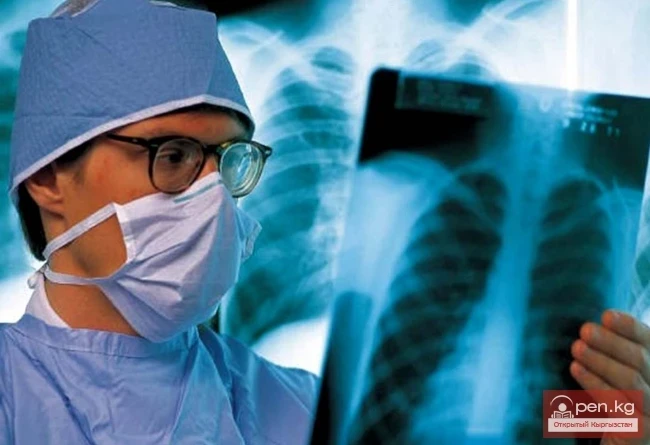
The Ministry of Health of the Kyrgyz Republic issued an order updating the regulations for the anti-tuberculosis service.
On September 25, 2014, a round table was held in Bishkek on the topic “Improving access and...
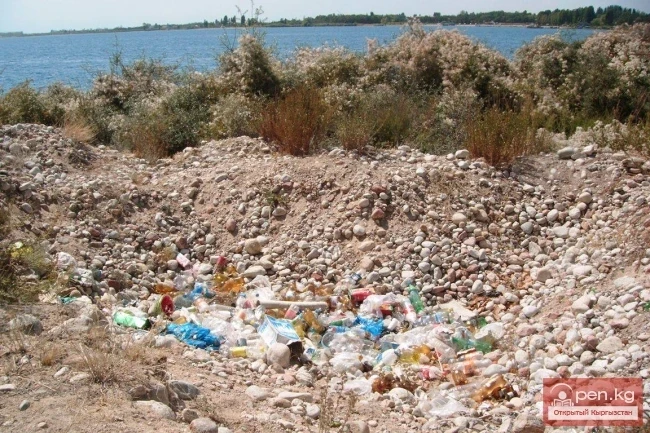
Round Table on Solid Waste Management
On September 30, 2014, a round table is planned to discuss issues related to the problem of...
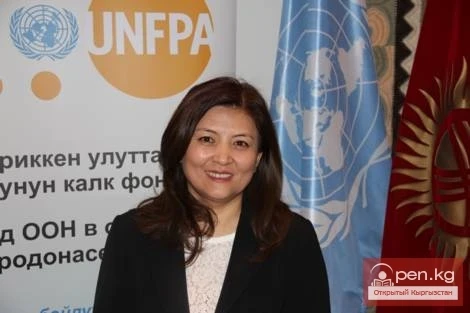
Current Issues in Reproductive Health and Family Planning
Recently, at the "Ak-Keme" hotel, the Ministry of Health of the Kyrgyz Republic and the...
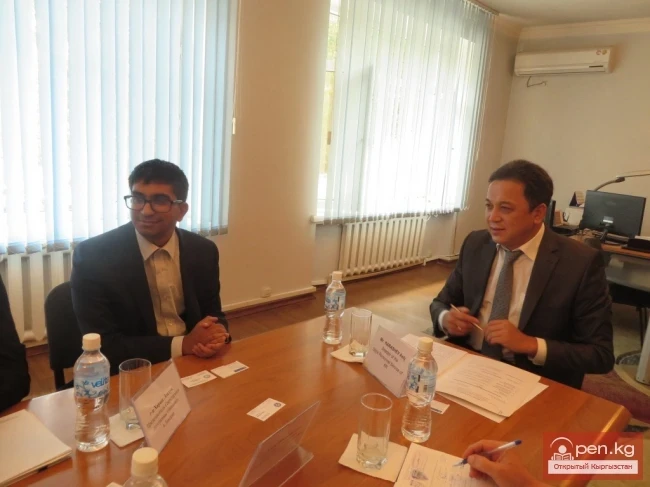
The State Personnel Service of the Kyrgyz Republic assists in the implementation of the "Chevening" program in Kyrgyzstan.
This was discussed at a meeting between the Director of the State Personnel Service of the Kyrgyz...

The best primary healthcare organizations in Bishkek received gifts and equipment.
On April 1, 2015, in Bishkek at the "City hotel," a meeting was held to mark the end of...

In the framework of implementing multilingual education in Kyrgyzstan
From September 19 to 21, 2014, a seminar on planning the activities of university innovation...
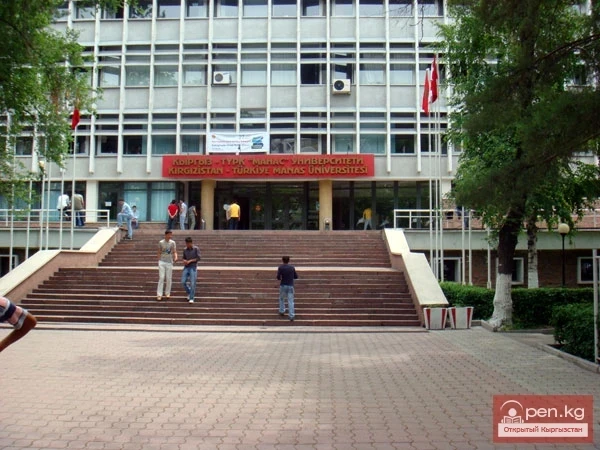
Students of the Kyrgyz-Turkish University "Manas" Choose a Healthy Lifestyle
The Republican Center for Health Promotion under the Ministry of Health of the Kyrgyz Republic...
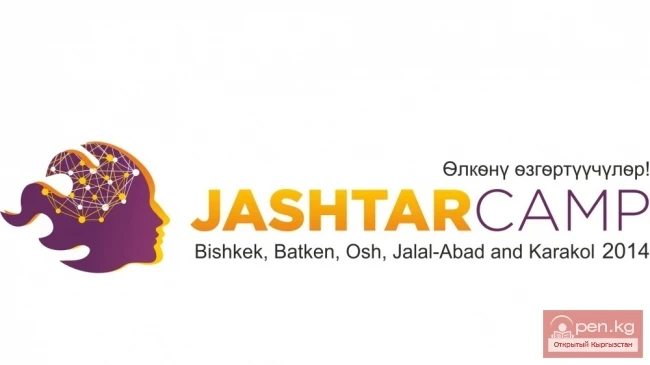
Youth Conference JashtarCamp-2014
On November 15 and 16, the annual unofficial youth [un]conference JashtarCamp-2014 will...
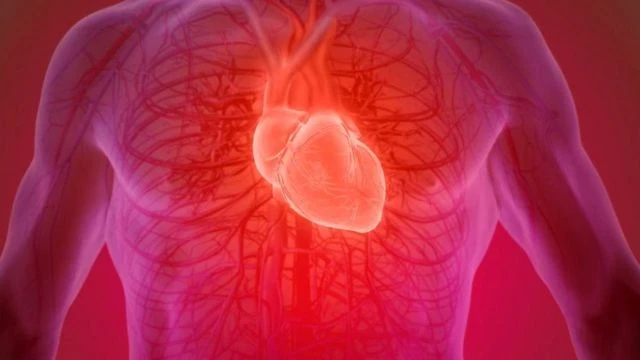
In Naryn, the first high-tech mountain hospital in the country will be established to treat cardiovascular diseases.
In Kyrgyzstan, a memorandum of cooperation was signed between the National Center for Cardiology...
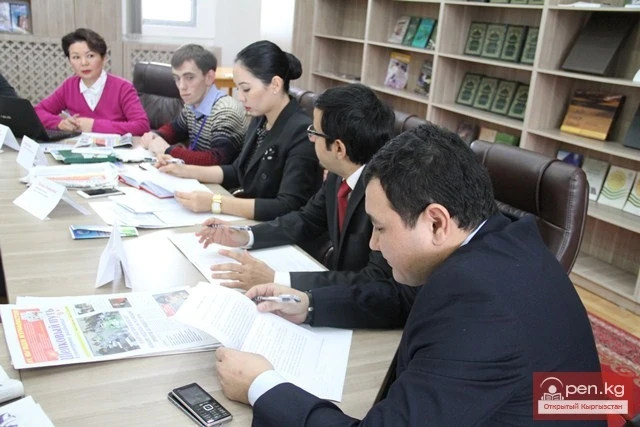
In the capital of Kyrgyzstan, a round table discussion titled "Orphanage Graduate, Status - Nobody" took place.
Problems of Orphanage Graduates Discussed Again in Kyrgyzstan A round table titled "Graduate...
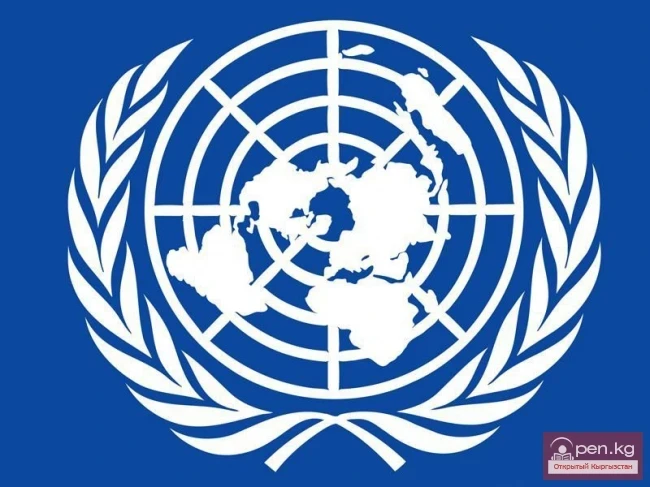
Kyrgyzstan — UN
Kyrgyzstan became a member of the United Nations on March 2, 1992. The UN Permanent Mission in...

Discussion of the list of goods for which it is proposed to apply preferential customs duty rates
In order to discuss the List of goods for which the Kyrgyz Republic intends to apply import...
A conference on wildlife protection is taking place in Bishkek.
On October 22, an international conference dedicated to wildlife conservation and the development...

"An Amazing Race" in Kyrgyzstan
The television companies “CBS” (USA) and “First Field International” (Russia), with the support of...

International Organic Forum 2014
From November 4 to 6, the International Organic Forum 2014 "Experience of the Organic...

In Bishkek, the participation of the business community in national projects within the framework of the EAEU will be discussed.
It is expected that the discussion will involve deputies of the Jogorku Kenesh, Russian diplomats,...
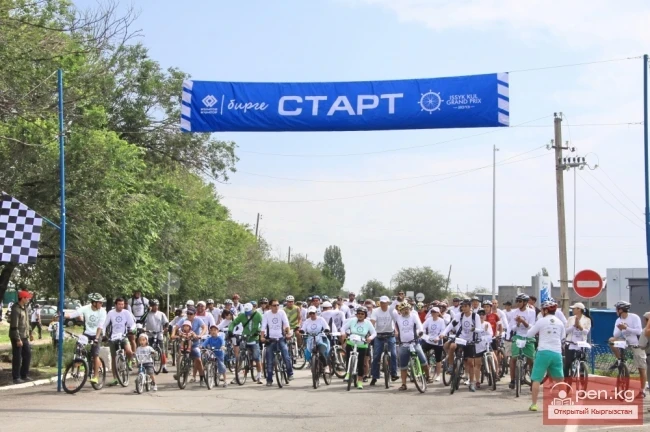
Bicycle Race and Bicycle Tour "Issyk-Kul Grand Prix 2014"
On August 16, a bike tour and bicycle race "Issyk-Kul Grand Prix-2014" will take place...
The French Ambassador proposed to include additional hours of French language in the school curriculum of Kyrgyzstan.
On October 22, the Minister of Education Dogdurkul Kendirbaeva held a meeting with the Ambassador...

Campaign for Cleaning Lake Issyk-Kul from Household Waste
As part of the preparation for the tourist season at Lake Issyk-Kul, work is planned for April-May...
In Kyrgyzstan, the winners of the "100 Best Deeds for the Beloved Village/City" award have been determined.
On December 25, a ceremony will be held in Bishkek to award the winners of the '100 Best...
Kyrgyzstan presented an updated strategy for the conservation of the snow leopard
In Bishkek, a forum was held dedicated to the International Snow Leopard Day, which is celebrated...
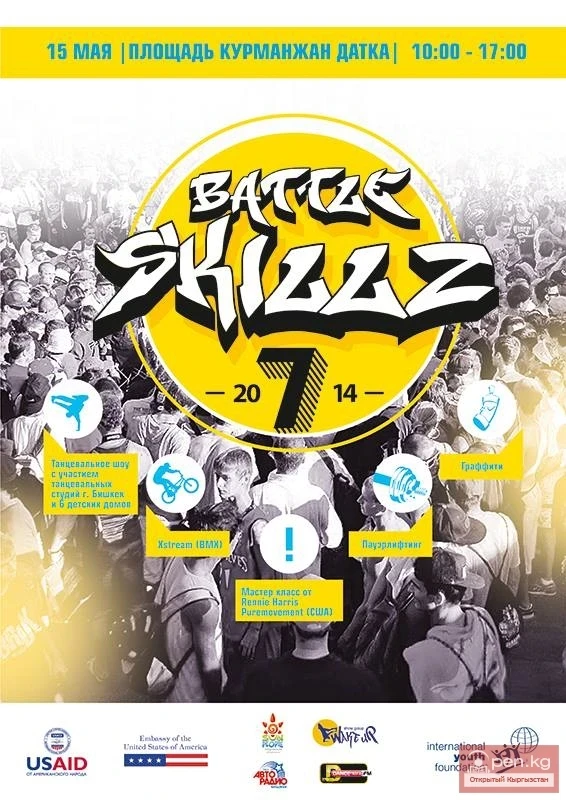
Seventh Annual Dance Festival Battle Skillzzz
The dance studio “Wake Up Dance Studio”, with the support of the Bishkek city administration, the...
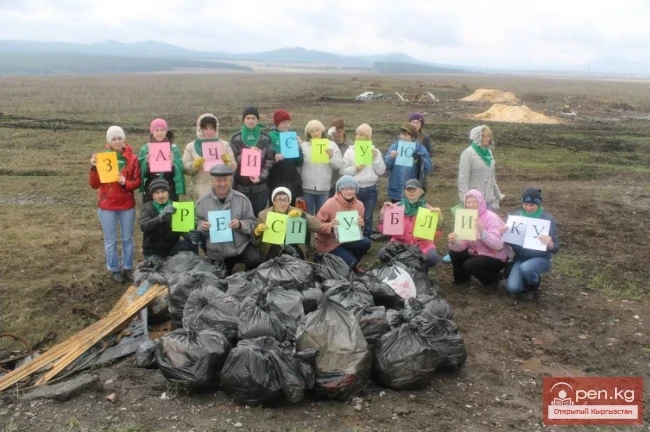
International Environmental Action at Issyk-Kul on September 14
International #EUBeachCleanup Action to Take Place at Issyk-Kul with EU Support for the First Time...
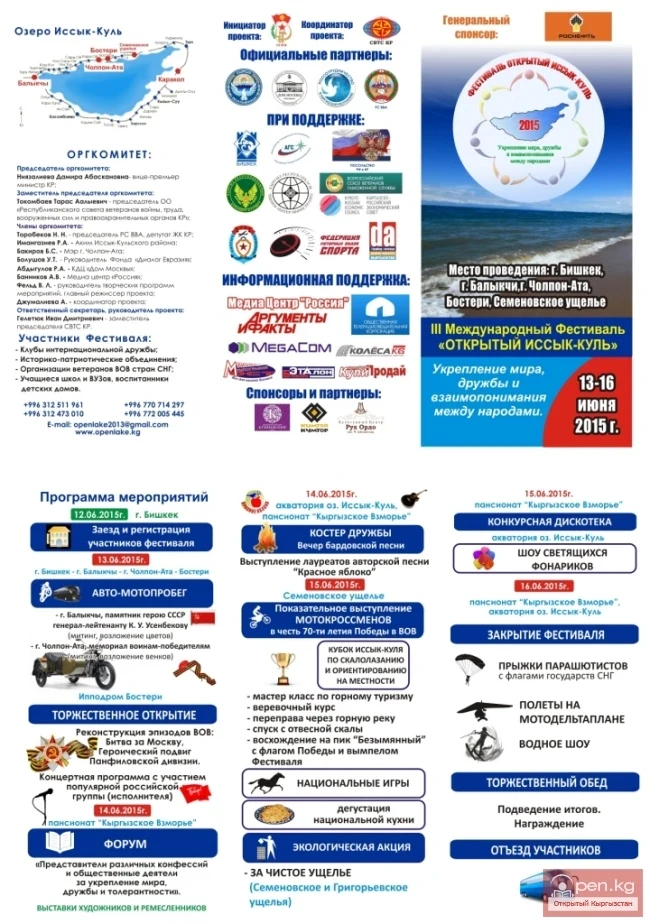
The third International Festival "Open Issyk-Kul" will take place in Kyrgyzstan.
The third International Festival "Open Issyk-Kul" will take place in Kyrgyzstan....
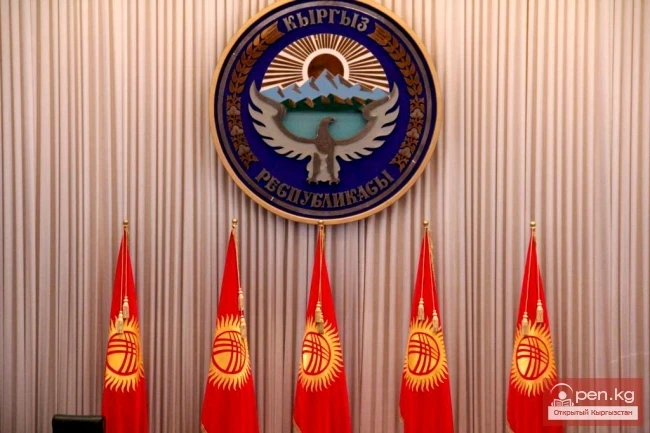
Kyrgyzstan - International Security Organizations
Kyrgyzstan — SCO...

Kuttubaeva Klara Beishenovna
Kuttubaeva Klara Beishenovna (1956), Doctor of Medical Sciences (2002) Kyrgyz. Born in Frunze....
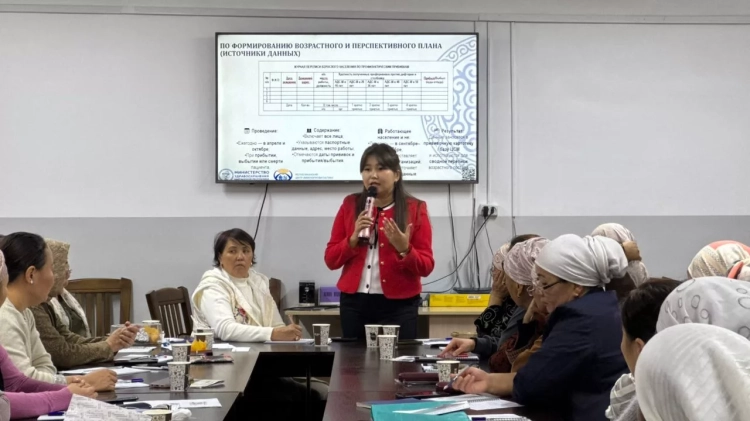
Zonal Training for Healthcare Workers Kicks Off in Kyrgyzstan as Part of the Catch-Up Immunization Campaign
As part of the training, healthcare workers will gain knowledge on how to effectively catch up on...

Snow Leopard. Symbol of the Heavenly Mountains
Tuesday, October 21, 2014, at 10:30 AM Venue: NABU branch office in the Kyrgyz Republic, Bishkek,...

Urban Forum in Bishkek
When: June 6 and 7...
In the city of Manas, more than thirty protocols were drawn up against parents during a nighttime raid.
In Manas, as part of the operation "Teen-Night," law enforcement officers drew up 32...
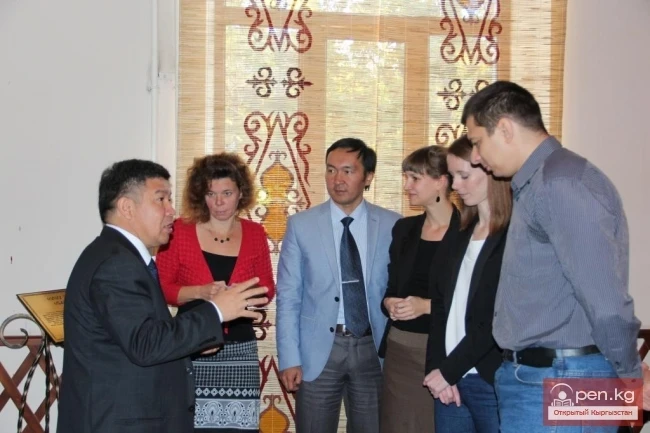
Promotion of the Rule of Law in Kyrgyzstan with a Special Emphasis on Transparency and Accountability
Today, October 22, 2014, a meeting took place at the Ministry of Justice of the Kyrgyz Republic...
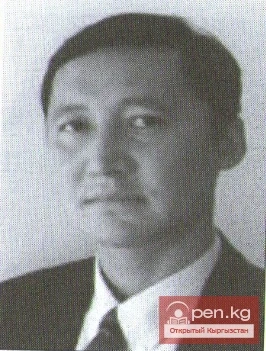
Nazaraaliev Zhenishbek Bolsunbekovich
Nazaraliev Zhenishbek Bolsunbekovich Doctor of Medical Sciences, Professor, Corresponding Member...
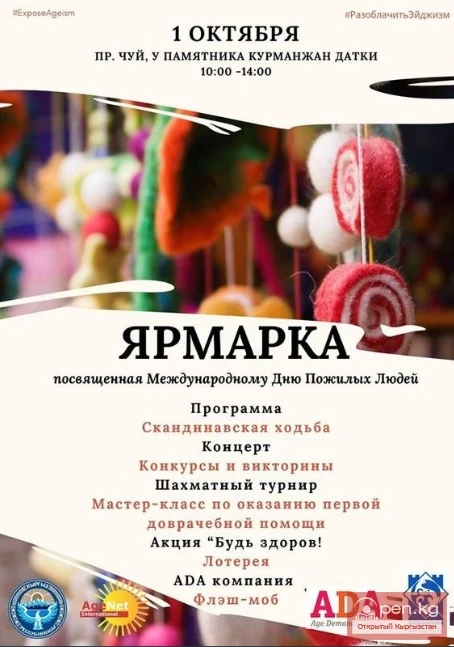
"Fair of Products by Elderly People 'From Heart to Heart'"
Resource Center for the Elderly On October 1, 2019, a Nordic walking event with the participation...
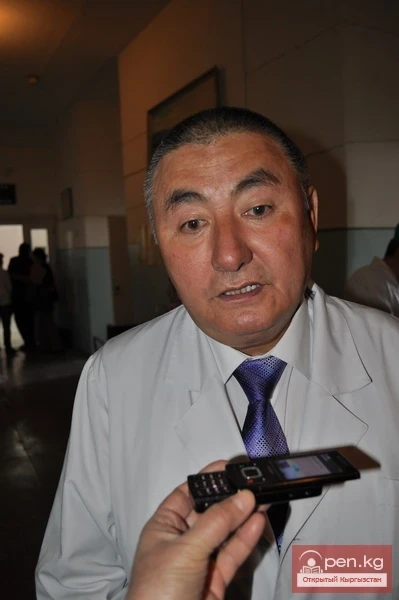
In Kyrgyzstan, laparoscopic methods for treating diseases in childhood will be implemented.
Kamchibek Uzakbaev, Director of the National Center for Maternal and Child Health: In Kyrgyzstan,...

Russian Aviation Base "Kant" in Kyrgyzstan
Russian Aviation Base "Kant" in Kyrgyzstan On October 23, 2003, the official opening of...
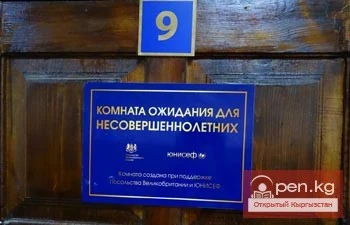
For the first time in Kyrgyzstan, special rooms for children in conflict with the law and a hearing room have opened in the building of the Lenin Court.
Today, March 22, an official opening of two rooms took place at the Lenin District Court in...

Training Camp "Running on Waves"
Program of the Training Summer Camp “Running on Waves” List of Program Organizers President of the...
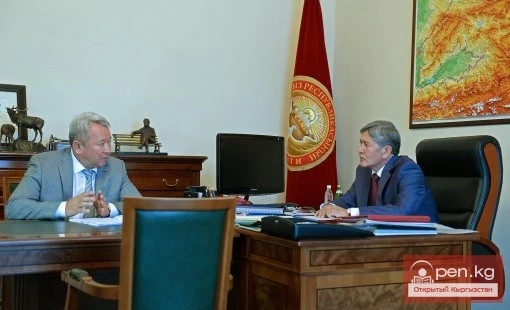
By September 1, 23 schools will be completed in Kyrgyzstan.
By September 1, 23 schools will be completed in Kyrgyzstan, as reported by the Minister of...

Autumn "DOG Show", September 21, 12:00 PM, "Asanbay" Park
Dear dog lovers and owners, and everyone, everyone, everyone!...
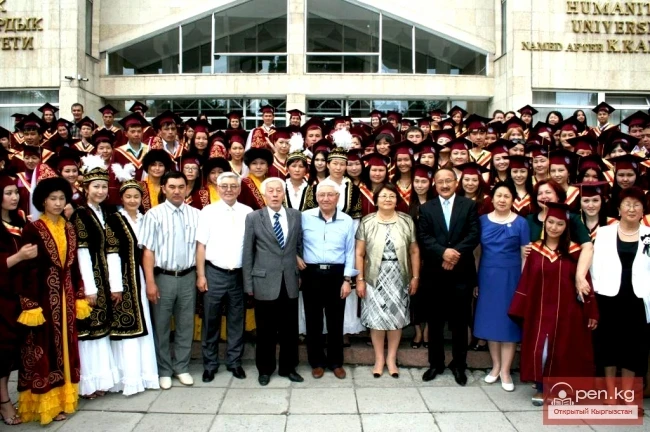
The Structure of Education in Kyrgyzstan
The structure of education in Kyrgyzstan encompasses eight official levels, approved by the Law of...
A Multilateral Dialogue on Combating Transport Air Pollution is Taking Place in Bishkek
On October 21, a multilateral dialogue was held in Bishkek dedicated to issues related to combating...
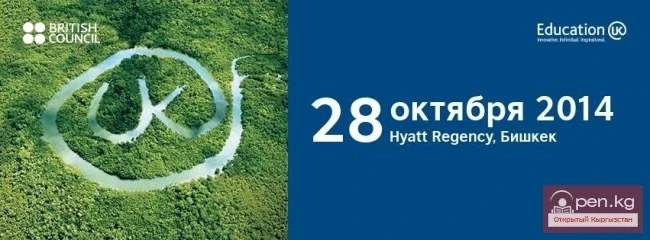
Exhibition of British Education Education UK-2014
The British Council invites schoolchildren and parents, students, and young professionals planning...
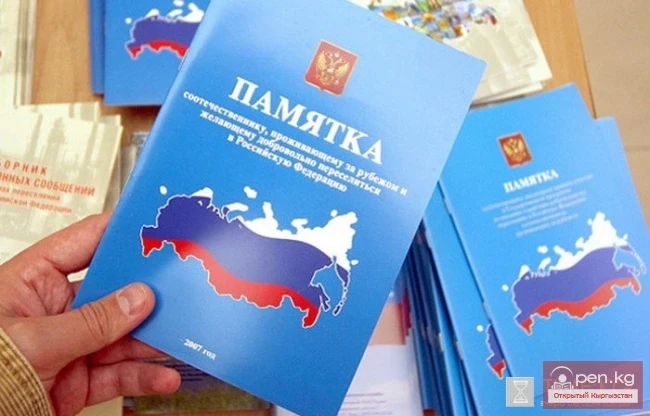
The Kamchatka Region Awaits Resettlers from Bishkek
On May 13, a presentation of the long-term regional target program to assist the voluntary...
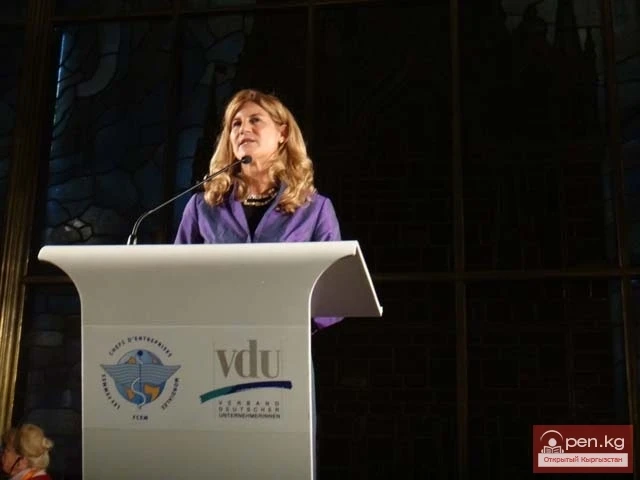
Congress of Women of Kyrgyzstan
A public and political mass organization established in May 1993. Its main objectives are: to...

Orphan Natalia Alexandrovna
Orphan Natalia Alexandrovna (1927), Doctor of Medical Sciences (1995) Russian. Born in Frunze....
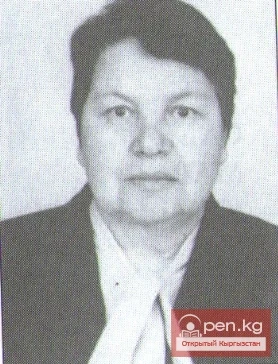
Larisa Borisovna Saburova
Saburova Larisa Borisovna Doctor of Medical Sciences, Professor. Born in 1938. Graduated from...

Collectible Coins Dedicated to the Series "Capitals of the Eurasian Economic Union Countries"
Since December 18, 2008, the National Bank of the Kyrgyz Republic has put into circulation a...

Beauty Industry Exhibition "BEAUTY EXPO-2014"
On October 9, 10, and 11, 2014, the largest international exhibition of cosmetics and perfumery,...
